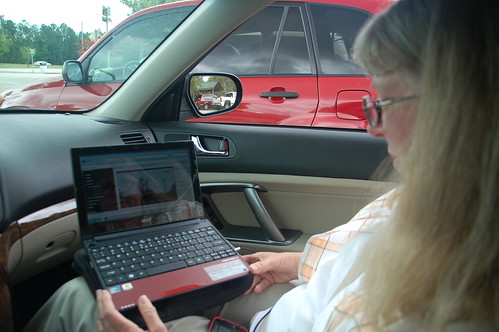The space shuttle Atlantis lifted off Friday morning for the last ever space shuttle flight. NASA is ending the 30 year program and all the remaining orbiters are being parceled out to museums. It is a sad, sad day.
We had hoped to actually see this launch. Be coincidence we were going to be in Florida the day of the of the launch, and we thought about leaving early on Thursday evening so that we could at least be in viewing range, even if it was just from a rest area on I-95.
Alas, that was not to be. The weather didn’t look like it was going to cooperate, and there was only a 30% chance that it would go up. Also, I’d had a particularly rough day at work, and was still dealing with work issues when I got home Thursday evening. Between those two, we decided to leave early Friday morning. If it launched, so be it.
We kept checking the news for weather reports frequently. We even used our phones to tether Laura’s netbook so that we could watch NASA TV as we drove (Well, Laura did. I had to keep my eyes on the road.)
Just as we crossed into Florida the shuttle launched. We were socked in with low clouds and didn’t have a clear view, so all we could do was watch it streaming on NASA TV from the Florida Welcome Center.
This has been an amazing program, and it’s hard to believe that 30 years have come and gone. I remember exactly where I was for both the Challenger and Columbia disasters. The International Space Station has been an incredible achievement, as has the Hubble Telescope and the subsequent repair missions to the telescope.
It is truly sad that there isn’t another grand program to take the shuttle’s place. Sure, there are lots of things on the drawing board, but they won’t be ready soon enough to keep the public’s interest. Unless these private companies can come through, I’m afraid the US is going to fade into the background as far as space is concerned.
I came of age at the height of the space program. I watched the moon landing and all of the other flights with keen interest. Even more so, the science fiction that I loved so much had grand predictions that we would have permanent moon bases by 1999, and even space hotels (and sentient computers) by 2001. Some of these visions have come true…
But most are still a dream.
It’s even worse for Laura, though. Her father actually was a rocket scientist with Hughes Aircraft. Components he designed in their basement wound up on some of the early planetary probes to Venus. For both of us, the lack of a vision for further US space exploration is almost a betrayal of his legacy. I’m hoping that we are wrong, and that human space flight will become common place, and that these early visions will come true.
But, back to the mission at hand. I hope all goes well for Atlantis and her four-member crew. I hope there are smooth sailings and a safe return. After that, I guess we’ll see.


